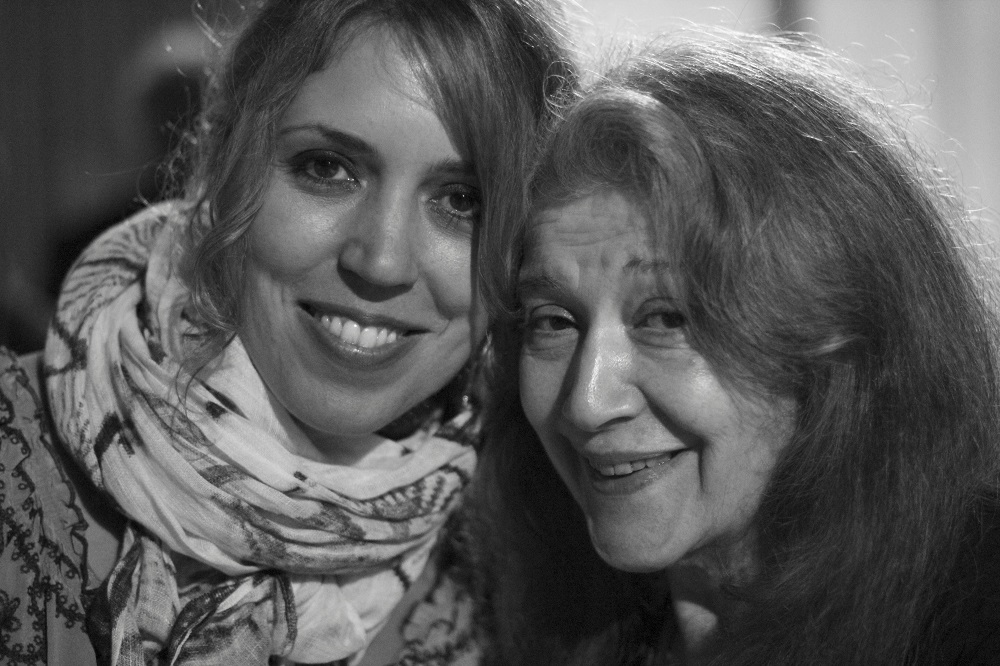For as long as I can remember, there has been a continuous loop of original music playing in my mind. My father used to joke about my “tuyuyo” – a little bump I have on the back of my head – that it was my personal repository for music. My husband, less versed in Venezuelan colloquialisms, simply refers to it as “the iPod”.
However mysterious its source, music is a constant soundtrack to my life. Since my mother first placed a toy piano in my crib when I was just seven months old, I have been playing original pieces of music with the same abandon and freedom I experience when talking or walking. There is never a plan. Never a template. No GPS. Almost never a conscious thought. It simply happens, and my relationship to that strange source is probably the most reliable, constant, consistent – if often maddening – relationship I have in my life.
My first piano teacher, Lyl Tiempo, had the wisdom to recognize the value of creativity. She understood that I was approaching the repertoire in reverse, as it were - beginning with the complete work in my head and deconstructing it in order to “learn” it, rather than constructing it from the ground up. But her insight was not shared by the teacher who took me through the most formative years of my life, in Miami. Not understanding it, she discouraged creativity - trashed it, even. Forced to be like everyone else, I tucked it away like an intimate, forbidden secret for almost three decades.
Until one very late night in Montreal. I was 31.
I was summoned in the early hours to play for the great, and famously nocturnal, Martha Argerich. I played some repertoire pieces for her, and then out it came. Something spontaneous. I didn’t really know what. But Martha wanted to know. “Just a piece about Martha Argerich”, I told her. She was tickled pink.
Martha insisted that I create in this way in front of an audience. Her permission unlocked my little secret, releasing it from deep within me and onto stages all over the world in the form of improvisation. Finally, I felt like I could be myself, and that I had a reason for being the musician I was always told by others I would be but hadn’t reconciled with myself. (Pictured below: Montero and Argerich).  Then came the serious question - what to do with all that music in my “tuyuyo”?
Then came the serious question - what to do with all that music in my “tuyuyo”?
Composing music, whether in real time or in advance of a performance, does not have to serve any aim other that the creation of music itself. Indeed, the 20th century saw a radical departure from the idea of “descriptive” music. But it can describe, and it can serve external purposes, should the composer choose it. That largely depends on the musical nature of the composer, the constraints of the time, and the external purpose to which the composer is drawn.
Musical history is replete with composers reflecting, codifying and even protesting the times in which they live. Indeed, a significant portion of the classical canon would not exist were it not so. Until the turn of this millennium, my life was unimpacted by matters so pressingly urgent that I felt a need to compose about them. I was just busy coming to terms with single motherhood and the concert life. What more could I take on than that?
Then, the country of my birth, Venezuela, elected Hugo Chavez. My life, and the life of all Venezuelans, would change for ever. At first, an intoxicating wave of optimism was carried around the world by Venezuela’s highly visible, highly photogenic youth orchestras. They seemingly embodied and disseminated a message of utopian cooperation, inclusion, equality and social justice, and the world purred its approval - all the way to the bank. I, too, was invited to join the party and, in 2004, explicitly offered lifetime financial security to do so by El Sistema’s founder, Jose Antonio Abreu.
I declined.
I declined because I could see from very early on that our young musicians, in being afforded a privileged status in a regime-dependent society, were gradually being recruited as human billboards for an ill-fated, Castro-Cuban model of “Revolution” which, far from alleviating poverty as claimed, would impoverish an entire nation in a calamitous, twenty-year act of state destruction, corruption and organized crime. The evidence is everywhere, as I write these words, but not so easy to accept just a few years ago when Mahler and Beethoven were drowning out the silent screams of ordinary Venezuelans.
That is when I decided to compose Ex Patria (2011). Described on the 2015 recording as a “both a personal lament and the collective protest of muted voices”, it is exactly that. Swimming against the tsunami tide of El Sistema mania, I set out to tell the real story of Venezuela, in music that reflected the times in which real Venezuelans were living – and dying. I was tired of music from bygone eras and cultures being used to conceal our current, regionally specific truth. I wanted to reveal that truth, with my own musical code. Ex Patria won me airtime and column space, which I dedicated to the Venezuelan crisis, not to music or career. Music became a tool for a bigger cause, not an end in itself. Real-time composing in recitals became moments of musical journalism, telling stories that the newspapers failed to tell, building what I saw as bridges of empathy.  Today, as my Piano Concerto No.1, the “Latin” Concerto (2017), is released on my latest recording (Montero pictured above in performance with Carlos Miguel Prieto and the Orchestra of the Americas), Venezuela is spiraling still further out of control – as if that were even possible. Our musicians, once the darlings of Carnegie Hall and the BBC Proms, have succumbed to the fate of the nation at large, as tragically predicted. They struggle to survive ravaging hyperinflation in the millions of a percent, and lethal food and medicine shortages. Many, on orchestra salaries of barely six dollars a month, have simply fled Venezuela in desperation, along with 4 million other exiles.
Today, as my Piano Concerto No.1, the “Latin” Concerto (2017), is released on my latest recording (Montero pictured above in performance with Carlos Miguel Prieto and the Orchestra of the Americas), Venezuela is spiraling still further out of control – as if that were even possible. Our musicians, once the darlings of Carnegie Hall and the BBC Proms, have succumbed to the fate of the nation at large, as tragically predicted. They struggle to survive ravaging hyperinflation in the millions of a percent, and lethal food and medicine shortages. Many, on orchestra salaries of barely six dollars a month, have simply fled Venezuela in desperation, along with 4 million other exiles.
To the discerning and informed listener, my Latin concerto, then, cannot be reduced to the simple level of “fun”. It is intended as a work of irony, not as a portrait of a mojito and salsa culture. Nor is it a specifically Venezuelan work, but a wide-angle view of South America. On its surface it seems to celebrate the visceral, rhythmical vitality of an indisputably energetic and musical continent. But a darkness runs through it, sometimes overt, sometimes more codified, reminding us of the malevolent forces that curtail our progress as a continent, the real progress that Chavismo – with the help of our youth orchestras – cynically attempted to conjure in the eyes of the world and sell to his South American neighbors, like the great illusionists of old.
Illusion has its place in our world, of course, and music can make a legitimate claim to offer poetic transcendence in our lives, most of which are lived in the distinctly prosaic world of daily duties. It ought to go without saying that music - on aesthetic, cultural and cognitive grounds alone - should constitute one of the building blocks of every child’s education, worldwide. But we must not allow boorish, opportunistic autocrats to hijack music and musicians to alter truth itself, by masking barbarism behind a seductive screen of youthful civility and exuberance. To engage in such state-sponsored propaganda is to submit to base servility, to diminish art itself, and to reduce the artist to the role of lackey.
Nina Simone once declared of her protest songs, “I sing them to let them know that I know who they are, and what they have done to my people! I do it because I am Nina Simone. It is who I am.”
Never have I, Gabriela Montero - the girl with the mysterious tuyuyo - identified with a moral stance so clearly.
Silence is not an option.
- Gabriela Montero's First PIano Concerto, along with Ravel's G major Concerto, is on the Orchid Classics label and reviewed on Saturday by Graham Rickson in hisClassical CDs Weekly column
- More classical reviews on theartsdesk














Add comment